Picket and Reunion: What at Stake for Former SPN Writers and Actors and How Fans Can Help
On Thursday August 30th, at urging of Supernatural Creator Eric Kripke, fans gathered with former SPN cast, writers and crew on the picket lines at Warner Brothers Studios in Burbank for what was called a “Picket and Reunion.” This event brought a lot of attention to the WGA and SAG-AFTRA cause and had some strong participation. The move was quite genius given the appeal of Supernatural, but Kripke knows the power of the #SPNFamily very well. “It’s a little overwhelming. It’s very humbling, and it’s very insane,” Kripke told Deadline. “The Supernatural fandom is a majestic and terrifying force…I have to say, I sort of expected this madness, but it doesn’t change how insane it is.” I think the promise of pie and burgers also helped, but a call to action to the fans usually delivers results.
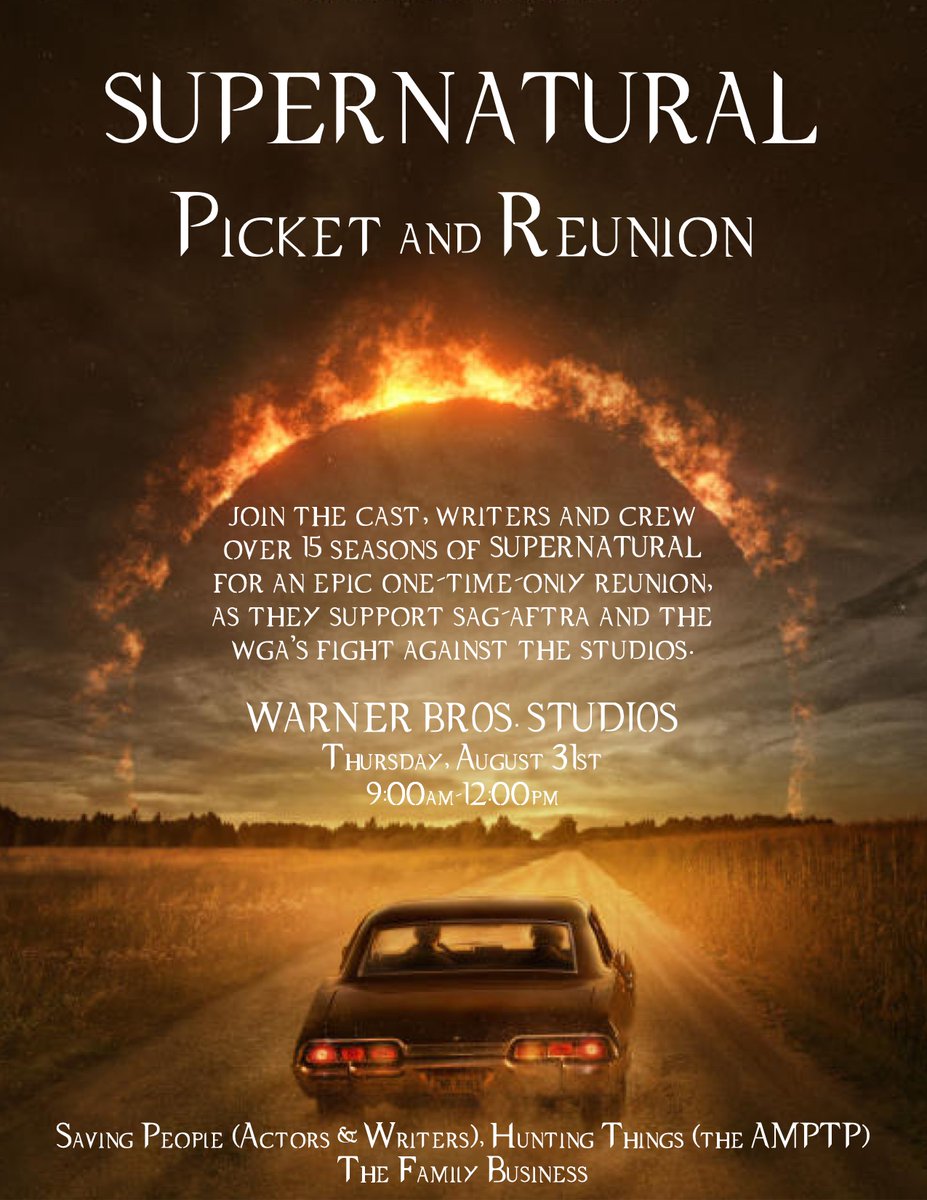
The question is, how many fans outside of LA really understand what is at stake here? How have these former Supernatural creatives been coping in this new landscape? Many people out there aren’t sympathetic to striking writers and actors, probably because the glitz and glamour portrayed by the Hollywood PR machine puts the highlight on the A-listers that don’t have to worry about missing paychecks. As I’ve gotten involved with blogging about Supernatural, I’ve met and interviewed many actors, writers, producers, and crew for this show and others. Almost all of these guys are not millionaires. They’re average people trying to make rent in one very expensive market and work in a very demanding industry that is continually stacked against them. This strike has exposed a chasm that has been forming in Hollywood for years, especially since the last strike – the move to streaming services as a major source of entertainment has not been done fairly to those creating the content.
How many #Supernatural actors can you spot in this video?! Tag them here!! BADASS turnout today #SPNFamily!!! ❤️💪🎬 #SagAftraStrike #WGAStrike pic.twitter.com/Kzc0hMEf9A
— ChadLindberg (@ChadLindberg) August 31, 2023
The Broadcast Network System
In the TV broadcast model, writers and actors get a fee per episode. The fee depends on the popularity and ratings of the show, but usually it is a sustainable wage, especially if someone is brought on staff. Broadcast networks have higher budgets because they can sell ads based on ratings projections. The higher the ratings, the higher prices and therefore the higher the budget. They also make far more episodes per season and shows usually run longer, unless they are cancelled for low ratings. It’s a nice, guaranteed paycheck for anyone staffed on a show.
On top of that, writers, actors and producers get residuals, aka payments for when the shows air in first run and in syndication, as well as DVD sales. That was a huge money maker for the creative team for Supernatural early in the show when the DVDs sold very well. This is money that creatives depend on to help with gaps between TV show and film projects, as well as provide some extra income years after a show ends (unless you were on the cast of Friends, which means you are set for life). Get a lead actor role on a long running successful show that sells to syndication worldwide (hint J2 hint), and residuals alone assure that worrying about an income won’t happen for years after a show ends, if at all. Unfortunately, that is a rare situation. Very few actors get that kind of break.
Most actors on TV shows though aren’t the leads. They get small recurring roles or one off guest appearances. They still get paid residuals though when the episode they appeared in is aired somewhere, which certainly helps in assuring income when they are in between gigs. But they aren’t making the big money. Residuals amount to rent and food money for a majority of actors and writers.
The Streaming Model
So why is Kripke gathering support on the picket line? Because the streaming services (Amazon Prime, Netflix, Disney Plus, Apple TV+, Max, etc) have destroyed the residual model. He dropped a dirty secret in the Deadline interview that is no surprise to those in the business, he as the showrunner, creator, and writer hasn’t received one dime for Supernatural airing on Netflix. Neither have Jared, Jensen, Misha, or anyone that was ever part of the show. Supernatural has been a massive hit on Netflix and streaming on that platform has broadened the show’s appeal and made it the big fan favorite it is today. Supernatural has been a big boost for Netflix too, who needed popular first run shows as part of their catalog to get people to subscribe to their services and check out other content, especially their original shows. Yet as a streamer Netflix doesn’t have to pay residuals for re-airing TV shows in second run.
I don’t always strike, but when I do, I quote Catwoman. pic.twitter.com/BA3NccehOy
— Gabriel Tigerman (@GabrielTigerman) August 31, 2023
How do streaming services get away with this? Their business model. They get a flat subscription fee from consumers every month. If a show is successful, that’s not going to make them any more money, except maybe with a slight lift in subscription revenue, which is often hard to attribute to one particular show when so many are offered and watched. Users could stream a particular episode of a show 50 times and that still won’t make streamer any more revenue than one viewing, unlike broadcast TV, which can equate increased viewership to advertising dollars with the Nielsen ratings. A fair residual model is really hard to quantify when dividing subscription income among creatives. That revenue is usually enough for streamers to create their own content, thus increasing their appeal to audiences. As of matter of fact, it’s usually not enough. Almost all streaming services have yet to make a profit with this model. Most services have had huge losses through the years. For example, Disney Plus recently announced a $512 million loss for the quarter, with losses totaling more than $11 billion since they launched in 2019.
This is one reason why streaming services don’t share actual streaming numbers when it comes to shows, because such disclosures don’t tell the true financial picture for these services. They don’t need those numbers to sell advertising, at least not yet, and telling true numbers might mislead people who think those would be true ratings. The Nielsen ratings for broadcast networks aren’t counting multiple viewings and are measuring controlled time slots to predict the popularity of a show to sell to advertisers. It’s harder to accurately predict ratings activity and when people will watch when someone is binge viewing Stranger Things years after it first aired during one random weekend.
Streaming services have also been guilty of reckless spending on content in order to establish themselves in the market, although these are entities usually backed by major corporate conglomerates with deep pockets, save for Netflix which has had to truly rebuild from scratch. A lot of this spending comes from expensive marketing campaigns to boost subscriber growth and creating their own original content. They can endure losses in streaming with boosts in other parts of their business. Look at Apple and Amazon, whose primary business has nothing to do with entertainment. They both got into streaming platforms because they had plenty of cash to do so.
For these conglomerates that come to the streaming table with their own broadcast network content, they can sell their shows in syndication to streamers like Netflix so that the studios can get the license fees but then they don’t have to pay any residuals to the talent. Supernatural was a huge boost for The CW and Warner Brothers financially with the Netflix agreement, but they have also gotten away with not paying the costly residuals that eat into their profits from such deals when shows are sold to other cable networks, such as Supernatural’s run on TNT.
"Family don't end in blood." And when writers and actors are in the fight for a fair contract my #supernatural family comes together. So great banding together today at Warner brothers. Such talent and such spirit. We will win this! Carry on… #wgastrong #sagstrong pic.twitter.com/W8aEFFnji3
— Todd Stashwick (@ToddStashwick) August 31, 2023
How Writers and Actors Have Been Impacted
Becoming a staff writer used to open up many opportunities. There’s the fee for penning a script, which on average is around $25,000 for a broadcast show. Given their title, writers would also get a per episode fee if they were on staff. A writer was committed to a 22 or 23 episode season, which would give them enough experience to move up that producing ladder if desired and someday run their own show. Supernatural has created multiple showrunners from their writing teams through the years, which is where the real money comes in terms of residuals. Naturally, that residual money decreases over time, but considering that Supernatural is still running on TNT and other places worldwide, that’s earning some nice income for all the actors, writers, and producers associated with the show.
On streaming shows, budgets are very thin. To control the costs, cast, crew and producers are getting paid per episode, but streaming series run only 8-10 episodes a season and they run for longer times than network shows, amounting to almost the same amount of work per season. Often times writers and actors make less than half of what they did on network shows, but are putting in the same amount of work.
Kripke better explained it this way to Deadline:
“Writers still get paid per episode. That’s insane to me. When I had young writers on Supernatural, they were making say $7k an episode, $8k an episode, but it was 22 episodes. After commissions and taxes, you could still get an apartment and live your life. Now, young writers are coming in on The Boys, working eight episodes at that same rate, have to pay all the commissions and work the exact same amount of time. It’s not like with eight episodes we only work one-third of the time. We work as long as we ever did on a season of 22. So it’s wild to me. You can’t live. You can’t make a living wage starting out in this business anymore.”
Family reunion #SAGAFTRAStrong #WGAstrong@TAronauer @StevenHein @SPNthenandnow @therealKripke @RuthieConnell @feliciaday pic.twitter.com/oSgqrarC72
— Rob Benedict (@RobBenedict) August 31, 2023
Streaming services have also made films and television under the idea of “content at all costs” without really considering the quality or longevity of a show, or even the impact to the industry. They have kept staffs very thin and have usually paid industry minimums. Over the last several years “Peak TV” has saturated the market with too many TV shows, so much so that viewers have become overwhelmed and unable to keep up. Very few TV shows have been considered hits. Too many shows have stretched the creative community too far, where they’ve had to create episodes with no budget and minimal staff with short timelines, working multiple projects per year just to stay afloat. As a result, most shows on streaming services only last a season or two and aren’t given a chance to thrive creatively. With Peak TV now busted and less shows being made, there will be less opportunities for writers and actors to take on those multiple projects, creating a big income gap.
Streamers do pay residuals for content they created, but they have found loopholes to push those amounts down as well. Since they aren’t candid with streaming numbers, no one knows how many viewings a show is getting and how much residuals they are entitled to. These days streamers are also dumping their original shows from their platforms after their runs and trying to sell them to free TV services like Tubi, Roku or Amazon Freevee. If they aren’t sold, they are gone from streaming entirely. By doing this, they don’t have to pay residuals. There have been many stories out there from actors and writers about getting residual checks for pennies, and they were on shows considered big successes that were sold to syndication internationally. The most publicized example out there is Orange is the New Black, which was a huge hit for Netflix, but the actors on that show were paid the minimum and have gotten laughable residuals since then.
As a result, actors and writers have had to scramble for alternate sources of income to make up for the disappearing residuals. Aside from many of them taking odd jobs like waiting tables, actors with some genre roles have been able to capitalize on the fan convention circuit. These fan conventions have exploded in popularity and can be found in any town now in the US and all around the world. Even actors from non-genre shows have been making appearances, all with the hope of getting that payday that has eluded them since their hit broadcast show went to a streaming service for syndication. Several Supernatural actors can be found at these cons each weekend. If an actor has a Supernatural acting credit, they are guaranteed some good publicity, a better appearance fee, and a line of fans paying for photo ops and autographs at a convention. This isn’t counting more private conventions that Creation Entertainment holds, like the Supernatural ones, which are even more lucrative for the featured guests, especially those that played an essential character on the show featured.
However, these con options aren’t open to most actors or writers, and the income is hardly guaranteed, especially if there are scheduling conflicts. It’s just another reminder that earning a fair wage is still the requirement to work in Hollywood. Without new projects, there won’t be actors from shows and films to promote at conventions after a while. Even Star Trek thrives by keeping its franchise alive, otherwise interest wanes and fan engagement falls off, and so does that extra revenue.
Amazing day on the strike lines with the cast and crew of #SPN! Thanks to all the fans for turning out to support and @therealKripke for arranging! #sagaftrastrong #spn #feliciaday pic.twitter.com/hBIx62odNv
— Felicia Day🇺🇸 (@feliciaday) August 31, 2023
Kripke fears that without giving writers sustainable income, no one will be able to make a living in the business, which will lead to a big exodus of talent:
“I just can’t get over how short-sighted that is, because there’ll be a brain drain. People will go to industries where they can live. If they want a vibrant new generation of writers, and if they want the next Barbie and Stranger Things and everything that makes billions of dollars, you have to support the kids that are breaking in. When I was striking in ’07, I would walk past these titans and they would always say like, ‘Oh, we’re striking for you.’ Now I feel like I’m that guy who’s [got] my cigar and my gold chains, but it’s true. I’m striking for all the kids that are out here, and I think it’s important.”
Solutions?
Coming to a middle ground is very tough because streaming services have shaken up the business model too dramatically. There’s no going back to the way things are in broadcast television, which has had nothing but dwindling viewership. This article in Screen Rant laid out some possible ideas. One of those ideas is for streaming services to start selling ads. Actually, that’s already in the works for some services. It’s all but inevitable that they all will go there, but will that revenue go to the creatives behind the content, or just continue to line to bolster the spending of streaming corporations who are bleeding money? That’s what these negotiations are supposed to work out.
The other option is larger appearance fees for actors and staffing writing teams with more writers that have guaranteed pay for a season. Getting streaming companies and large media conglomerates to give up that pay at a time when years of out of control spending is coming back to bite them has proven extremely difficult, but at some point they have to give up something if they want to be in the entertainment business. Still, historically, because of the obligation to shareholders, giving up profit margins to pay talent what they deserve is usually not an option. This results in the cost being passed onto the consumer through increased subscription services and more premium service options. Many consumers are already “cord cutting” so to speak, cancelling their cable and streaming services because they are getting too expensive and aren’t providing as much value. That feeling in part is due to so many shows being yanked off of the services to save on residuals, as well as the lacking quality of many of these shows.
Also of note, everything being ground to a halt in film and television isn’t just hurting actors and writers but everyone involved in the industry, including the crew members and supporting staff that are also out of work right now. The impact to California’s economy alone sits at billions of dollars in losses. So other unions and politicians have tried to apply some pressure, but so far that has proven to be ineffective by belt tightening corporate giants.
How Fans Can Help
So how can fans be involved? One way is to donate to these causes. The AMPTP is determined to let this strike drag out until writers and actors start losing their homes and will give into their demands. These groups are helping people in the entertainment industry get by:
Entertainment Community Fund – https://entertainmentcommunity.org/
Emergency Financial Assistance Program – https://members.sagfoundation.org/donate
Support any of the numerous food drives out there for those on the picket lines. There are too many links here to mention, but they can be found by your favorite writers or actors online usually. Some of the groups running drives are fandom based.
Share information! Share this article or any others that promote the inequities happening in television and film production for awareness (there are links to some informative articles below).
Share your support vocally online. If you’re on X (formerly known as Twitter), Instagram, Facebook, TikTok, etc, share whatever messages out are there about what’s happening on the picket lines or any information from an actor or writer in general who’s fighting for the right to be paid fairly.
Here are the links social media toolkits from the WGA and SAG-AFTRA that have good information on what to share:
https://www.wgacontract2023.org/take-action/social-media-toolkit
https://www.sagaftrastrike.org/social-toolkit
What a huge turnout of #SPNFamily at WB today in support and solidarity with the WGA and SAG! Honored to picket alongside the folks who work to create the shows we love as they fight for a fair contract. It’s a rough time in our industry right now, but we carry on.
— Alana King (@_AlanaKing_) August 31, 2023
Knowing all this, no wonder the strike has now been going on for four months now with no end in sight. The end goals for each side seem incompatible at this point. I can see the genius of Kripke’s Picket and Reunion, it is now time to let the fans be heard. Maybe fans can add some pressure as well for a resolution. It’s worked for save our show campaigns, why not a long strike? It will be interesting to see how this all shakes out, but in the meantime fan support would go a long way in helping creatives dream of continuing to do what they do best. Or, as the poster said,
“Saving People (Actors & Writers), Hunting Things (The AMPTP), The Family Business.”
Articles for those that want to be more informed about the strikes:
https://apnews.com/article/streaming-shows-removed-residuals-4be3ac859c766c352e57ef96176fd812
https://fortune.com/2023/07/19/what-are-residuals-hollywood-writers-actors-strike-streaming/
https://screenrant.com/actors-strike-residuals-streaming-netflix-explained/
https://variety.com/2023/biz/news/writers-strike-wga-four-months-amptp-1235711029/
Got any links or other information? Please share in our comments.


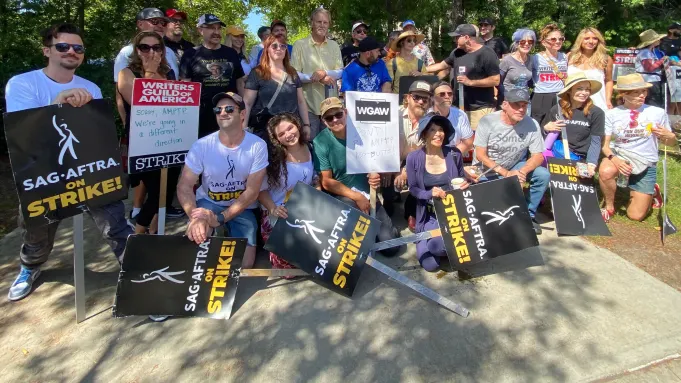

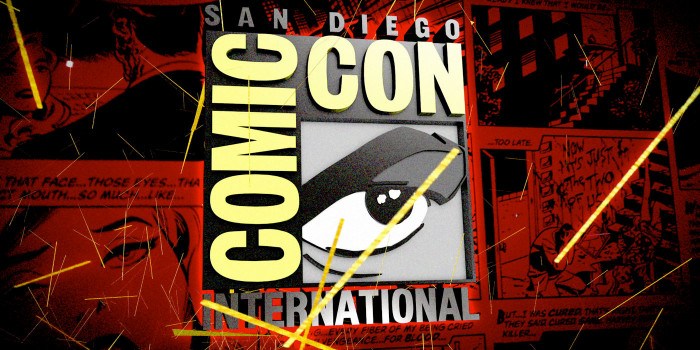
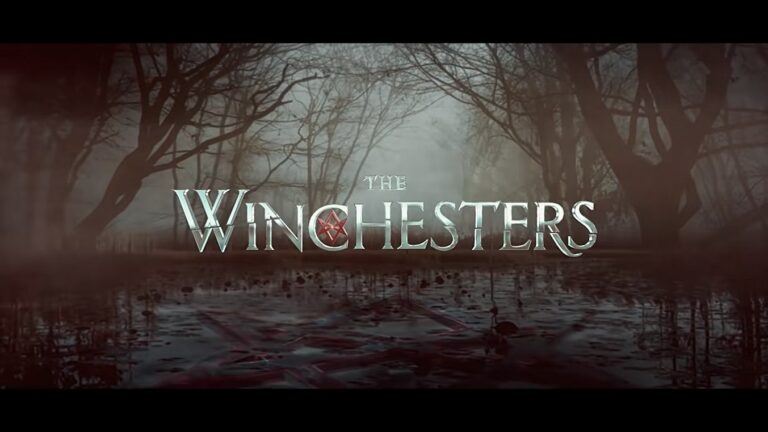
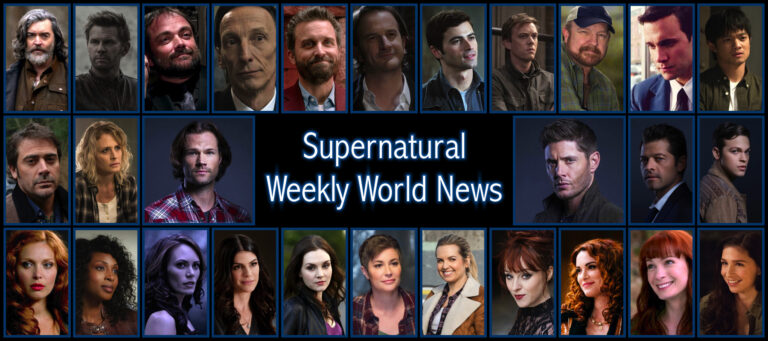
Leave a Reply